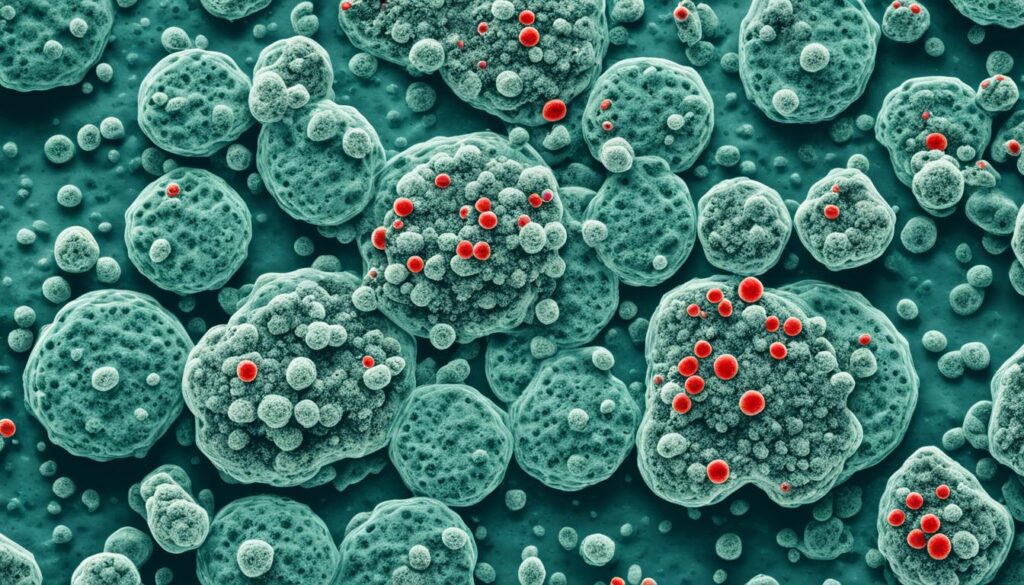
Transforming Your Space with can Mold cause cancer
Welcome to our in-depth exploration of the potential health risks associated with mold in your home. In this section, we will investigate if mold exposure can lead to cancer and how it can impact your overall well-being. Understanding the implications of mold growth is crucial for creating a safe and healthy living environment for you and your loved ones.
Key Takeaways:
- Mold exposure in your home can pose potential health risks.
- Respiratory problems and allergic reactions are common health effects of mold exposure.
- Research on the direct link between mold and cancer is limited.
- Maintaining a safe living environment involves addressing mold issues promptly.
- Seek professional assistance from Fix Mold Miami, Florida’s Highest Rated In Mold Assessments, Prevention, and Remediation at 305-465-6653 if you suspect mold growth in your home.
Understanding the Health Risks of Mold
When it comes to mold exposure, understanding the potential health risks is crucial. Mold can have various effects on your well-being, particularly on your respiratory system. In this section, we will explore the health effects of mold exposure, including respiratory problems and allergies.
Mold Exposure and Respiratory Problems
Mold spores can be inhaled into the respiratory system, leading to a range of respiratory issues. For individuals with pre-existing respiratory conditions such as asthma or chronic obstructive pulmonary disease (COPD), exposure to mold can exacerbate symptoms and make breathing difficulties worse.
In some cases, mold exposure can even cause respiratory infections. When mold spores are inhaled, they can irritate the airways, triggering inflammation and potentially leading to infections like bronchitis or pneumonia.
It’s important to note that the severity of respiratory problems caused by mold exposure can vary depending on factors such as the concentration and duration of exposure, as well as an individual’s overall health.
Allergic Reactions to Mold
For individuals with allergies, exposure to mold can trigger allergic reactions. Mold spores contain allergens that can cause symptoms such as sneezing, coughing, itchy eyes, and a runny nose. Allergic reactions to mold are particularly common in individuals who have a history of allergies, asthma, or other respiratory conditions.
It’s worth mentioning that the specific symptoms and severity of allergic reactions can vary from person to person. Some individuals may only experience mild discomfort, while others may have more pronounced symptoms.
| Health Effects of Mold Exposure | Risk Factors |
|---|---|
| Respiratory problems | Pre-existing respiratory conditions |
| Allergic reactions | History of allergies or asthma |
It is important to identify and address any mold growth in your living environment to mitigate the risk of respiratory problems and allergic reactions. Seeking professional assistance, such as Fix Mold Miami, can provide the expertise needed to assess and remediate mold issues effectively.

Examining the Link Between Mold and Cancer
In this section, we will delve into the research and studies conducted on the potential carcinogenic properties of mold and investigate the relationship between mold and cancer.
Over the years, there have been numerous studies exploring the potential link between mold exposure and cancer development. While the evidence is not yet conclusive, research suggests that certain types of mold may possess carcinogenic properties that could contribute to the development of cancer.
One particular type of mold that has received considerable attention is Aspergillus. According to research conducted at the National Institute of Environmental Health Sciences, Aspergillus releases substances known as mycotoxins, which can have harmful effects on human health.
Some studies have shown that prolonged exposure to certain mycotoxins produced by Aspergillus, such as aflatoxins, may increase the risk of developing liver cancer. These mycotoxins can contaminate food crops, particularly peanuts, corn, and tree nuts, and can find their way into our homes through contaminated products or improper storage.
Additionally, other types of mold, such as Stachybotrys chartarum (commonly known as black mold), have been associated with various health issues. However, the link between black mold and cancer remains unclear and requires further investigation.
Research and Studies on the Carcinogenic Properties of Mold
Scientists and researchers continue to explore the potential carcinogenic properties of mold through various studies. These studies aim to identify specific mold species, understand their mechanisms of action, and determine the potential risks they pose to human health.
- A study published in the journal Environmental Health Perspectives found that exposure to mold in early life may increase the risk of developing childhood acute lymphoblastic leukemia (ALL), a type of blood cancer. The study suggests that certain genes involved in immune response and DNA repair may interact with mold exposure to increase the risk.
- Another study published in the International Journal of Molecular Sciences investigated the link between mold toxins and lung cancer. The researchers found that exposure to mycotoxins produced by mold can induce DNA damage, oxidative stress, and inflammation, which may contribute to the development of lung cancer.
“Although more research is needed to establish a definitive link between mold and cancer, these studies provide crucial insights into the potential risks associated with mold exposure. It is essential to take precautions to prevent and address mold growth in our living environments.”
While these studies demonstrate the ongoing research efforts to understand the relationship between mold and cancer, it is important to note that additional studies are needed to establish definitive conclusions. The complex nature of cancer makes it challenging to isolate mold exposure as the sole cause.
Nevertheless, it is crucial to prioritize a healthy living environment by addressing mold issues promptly. Regularly inspecting your home for mold growth, maintaining proper ventilation, and promptly addressing any water damage or moisture issues can help mitigate potential health risks associated with mold exposure.

| Type of Mold | Potential Carcinogenic Properties | Associated Risks |
|---|---|---|
| Aspergillus | Production of mycotoxins, such as aflatoxins | Increased risk of liver cancer |
| Stachybotrys chartarum (black mold) | Unclear | Requires further investigation |
Conclusion
In conclusion, mold exposure can indeed pose potential health risks, including respiratory problems and allergic reactions. While research on the direct link between mold and cancer is limited, it is important to maintain a safe living environment by addressing mold issues promptly.
If you suspect mold growth in your home, it is recommended to seek professional assistance from Fix Mold Miami, Florida’s Highest Rated In Mold Assessments, Prevention, and Remediation.
Contact Fix Mold Miami at 305-465-6653 for a mold assessment and ensure a healthy living environment for you and your loved ones.




